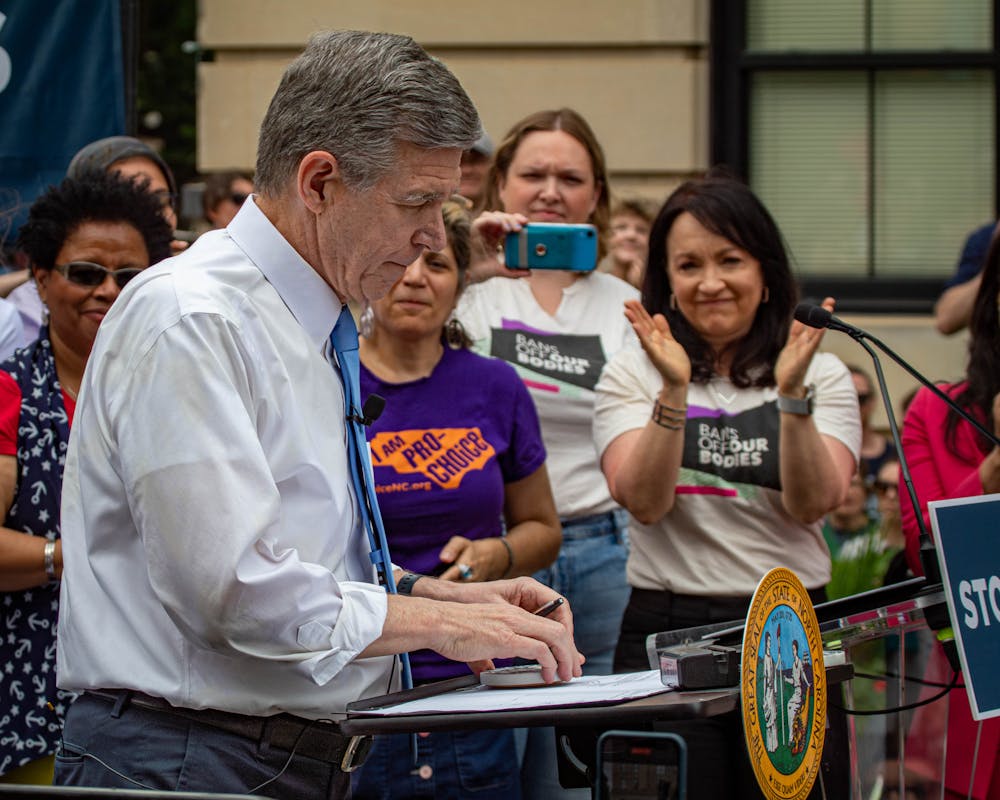North Carolina Governor Roy Cooper recently vetoed the proposed Senate Bill 747 — a bill that would have made it more difficult for young people and people of color to vote. As a result, Elon Votes is encouraging students to utilize campus resources and learn more about civic engagement.
SB747 was proposed earlier this year and would make it more likely for absentee ballots to be thrown away as a result of minor issues. SB747 would not only place a time constraint on when an absentee ballot could be received, but also require ballots to use what has in the past been considered unreliable signature matching technology as a way to verify votes in certain counties, going as far as to fail to properly fund elections at the state and county levels.
In a press release, Gov. Cooper said the legislation was designed to enhance the influence of the Republican legislature.
“This legislation has nothing to do with election security and everything to do with Republicans keeping and gaining power,” Cooper said.
Junior Clara Watkins, a policy studies major and member of Elon Votes, said she chose to be a policy studies major to learn about civil discourse.
“Everyone should be educated in civic engagement because the policies being enacted now are going to affect our generation a lot more specifically than any other generation,” Watkins said.
After North Carolina State Rep. Tricia Cotham announced her change in party affiliation to the Republican party in April, Democratic Party Chairs Jane Whitley and Anderson Clayton called for her resignation calling the action a deceit of the highest order.
Cotham’s party change granted the North Carolina House a Republican supermajority, enabling the legislature to override vetoes. Since Aug. 16, the House has successfully voted to override six of Cooper’s vetoes but has yet to make any effort in overturning SB747.
Watkins said it feels like the political climate has experienced a backslide.
“It feels like we are regressing in the sense that we are restricting voting,” Watkins said. “I can’t wrap my head around a bill that would restrict many working-class people from voting.”
Watkins said this shouldn’t just be looked at as a solely political issue and she fears if a bill like SB 747 was passed, fewer people will turn out to vote.
“People already see their vote as ineffective,” Watkins said. “With the leaders of their government trying to implement this, that sentiment will be even more solidified for some people.”
Elon University's campus has resources dedicated to helping students register to vote — both in North Carolina and in their home states.
Junior Bo Dalrymple, a political science major, said he has been working with Elon Votes since his freshman year. Dalrymple’s current role is to be a co-coordinator corresponding with Elon Volunteers and the Andrew Goodman Foundation leading meetings to decide what direction the organization wants to go in and what they choose to pursue.
According to its website, Elon Votes' mission is to “provide resources for students to vote in elections”and “to promote civic engagement on campus.” Dalrymple said he wants to increase student access to voting.
“We want to increase access and reduce barriers for students,” Dalrymple said.”We want to help identify what our changing options are — we understand that these things are always changing voting, access, and abilities are going to change as time goes on, so it's up to us to identify what avenues there are for students and reduce these barriers is any way that we can through our work.”
Dalrymple said young voters play an important role in today’s politics.
“A big storyline has been how important the youth voting bloc is, how transformative it has been in certain elections and I think it’s a growing thing,” Dalrymple said. “For us young people, this future that we inherit — it comes down to us.”
He said it is vital for young people and students to vote.
“There's a lot of current things happening — future things or future consequences as well — that are dependent on one, if we vote; and two, how we vote.”
Students can visit the Elon Votes website or office in the Kernodle Center for a number of resources regarding a variety of information from how to register to vote to information on the candidates running in upcoming elections — especially the local municipal elections which will take place on Tuesday, Oct. 10 and Tuesday, Nov. 7.
Dalrymple said “By restricting voting access it’s fair to say that this can challenge our democracy so I think it’s very notable that one he’ll veto it and it likely won’t be overwritten”
Had Governor Cooper not vetoed SB747, there would have been a significant amount of changes in the way voting occurs, including the exclusion of any missing witness information from the categories of curable deficiencies, the allowance of poll observers to move around polling locations and take photographs limiting voter privacy, and allowing voters to challenge ballots within their entire county.
Watkins said all young people should show interest and engage in civic life to make sure bills like this don’t get passed.
“It’s so important to get involved and to write your senators and tell them that the people they serve do not agree with this and will not stand for it,” Watkins said. “Your voice and your vote matter.”


